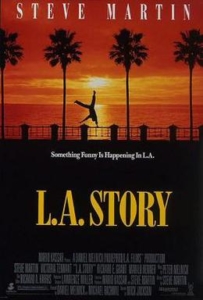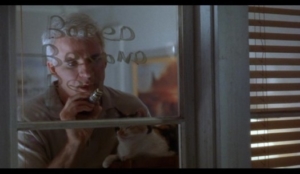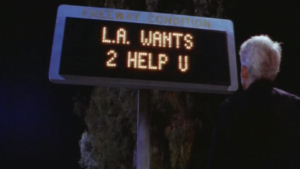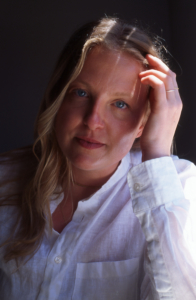An L.A. Story
 The other day, I watched L.A. Story (1991) with Steve Martin for the first time since I was a child. It’s a story about Harris K. Telemacher – a wacky television meteorologist by day, an intellectual with a PhD in Arts and Humanities by night. Harris lives in Los Angeles, a city known for valuing wealth and appearance over knowledge and character.
The other day, I watched L.A. Story (1991) with Steve Martin for the first time since I was a child. It’s a story about Harris K. Telemacher – a wacky television meteorologist by day, an intellectual with a PhD in Arts and Humanities by night. Harris lives in Los Angeles, a city known for valuing wealth and appearance over knowledge and character.
Despite his creeping existential angst about being unfulfilled, Harris finds joy in roller skating through art museums and making jokes about the constant sun, freeways, vapid brunches, and the everyday whimsy that one finds in L.A. His life changes when an electric billboard stops him and tells him that L.A. wants to help him. He’ll know what to do if he can unscramble the sentence: “how daddy is doing.”
As a child growing up in Boulder, Colorado, I used to watch this movie on VHS with my father. He loved Steve Martin and although he had many criticisms of Los Angeles and its lack of environmental sustainability, he loved this movie.
***
My dad was an architect who specialized in solar design and environmental sustainability during a time when few people understood or admitted to what fossil fuels were doing to the planet. Designing buildings more thoughtfully and based on their orientation to the sun was just logical to him. This saved money for the owner and exponentially reduced carbon emissions. But it was a battle against oil, a fight which continues, even now. As one of the founding creators of the LEED (Leadership in Energy and Environmental Design) building certification system, he did end up having a fundamental impact on how developers think about building and design. But he always had a lightness and positivity toward the future, despite the grim reality of the climate crisis. When he gave talks or lectures, they were speckled with “green” humor and laughter. I followed in his footsteps and did a master’s in urban design. When I enrolled, he told me, now we can work together to influence design to be more sustainable.
Throughout my childhood, his dad humor embarrassed me. But now, twelve years after his death, I wish I could hear him tell a corny joke so badly. When he died, my life changed immediately, immensely. I lost my youthful lightness and laughter. I moved back to the states from London, the Great Recession made it difficult to start a career in urban design, and in my grief, I decided to move to Los Angeles where a few of my friends lived. I thought maybe tinsel town would help restore my spirit.
***
Now, when I watched this movie alone, I laughed at the parts I did not understand as a child. When the woman Harris courts says, “can’t we walk?” and he laughs aloud, saying “no one walks in L.A.,” I could almost hear my father laugh in the background, as he had done so many times when we were together.
“Some of these houses are over twenty years old … dating back to the early nineteen seventies,” Martin says.
I guffaw when I remember thinking that was a long time. The opening really jarred me in a way I did not remember as a child. Steve Martin is on a stationary bike in the park. He says he’s had seven imaginary heart attacks.
“I was deeply unhappy, but I didn’t know it because I was so happy all the time,” he says.
I think now that my father related to this feeling. He was always happy, but he also faced many challenges in his career and personal relationships that I had little compassion for as a child.
What struck me most about watching this again after thirty-ish years is that I have become Harris K. Telemacher, the over-educated intellectual who is undervalued in L.A and living with a cat. The similar situation of approaching middle-age, having imaginary heart attacks, driving the extensive highway systems, wondering what I am doing with my life. The hope I had to restore my spirit in sunny L.A. was not realized. Instead, my time here has been overshadowed by car culture, being on the low end of the extreme wealth gap and questioning if this is the right place for me when I don’t even like the weather. When I started out, I worked in kitchens and cooked for celebrity events. Sleep deprived and disappointed, I passed the point of no return. This was no longer a phase but my life. I got so caught up in the hustle to survive I forgot what it felt like to enjoy waking up.
There is a scene of Harris and his cat in the window of his house I really relate to. He despondently writes Bored Beyond Belief on the glass with a marker. As someone who has always had a dark, existential humor à la Samuel Beckett, a moment like this is comical to me. Yet, simultaneously watching it like I was looking in the mirror stirred me in a way that made me think of all these connections in my life and how odd and wondrous it was that I moved to Los Angeles to experience this.
me. Yet, simultaneously watching it like I was looking in the mirror stirred me in a way that made me think of all these connections in my life and how odd and wondrous it was that I moved to Los Angeles to experience this.
In the end, the billboard did help Harris win the affection of the woman he was courting, and it helped him become more honest with himself. The answer to the riddle that the billboard gave Harris turns out to be “sing doo wah diddy.” My father faced the challenges in his life much the same way: by singing doo wah diddy. He met obstacles with humor and connected to people by making them smile.
Perhaps I need a billboard with a riddle to stop me and guide me through the next transition in my life. Just like in the movie, I watch the electric pink SoCal sun rise and set and still feel like living here is surreal. L.A. Story is an homage to the city of angels – a bittersweet love story – and that is how I feel about it, too. In this city, I have learned a lot about myself, social inequities, and what I don’t want. I have hiked in the creamsicle crepuscule of Griffith Park and sobbed in the car before a three a.m. shift at a bakery. This movie reminds me that I  should take a break from the weight of environmental and financial angst and roller skate through a museum once in a while. I can imagine my father saying, Lighten up. Life is too short. Dear Los Angeles, thank you for being the backdrop of many difficult lessons. I hope I find a way forward, singing doo wah diddy.
should take a break from the weight of environmental and financial angst and roller skate through a museum once in a while. I can imagine my father saying, Lighten up. Life is too short. Dear Los Angeles, thank you for being the backdrop of many difficult lessons. I hope I find a way forward, singing doo wah diddy.
Franz Franta is an urban sustainability practitioner and Antioch University MFA graduate. With an international background and previous masters’ in urban design, she concentrates her writing on how cities impact the psyches of citizens. She lives in Los Angeles.





